

F1000 Research: providing clarity on scientific quality. I promised in my last post to follow up on some recurring themes in many of the discussions that have been ongoing around the plans for F1000 Research.
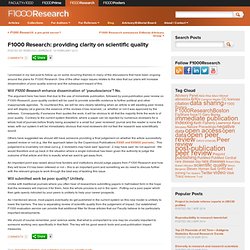
One of the other major issues relates to the idea that our plans will increase dissemination of poor quality science and the subsequent impact of this. Will F1000 Research enhance dissemination of ‘pseudoscience’? No. The argument here has been that due to the use of immediate publication, followed by post-publication peer review on F1000 Research, poor-quality content will be used to provide scientific evidence to further political and other inappropriate agendas. To counteract this, we will be very clearly labelling when an article is still awaiting peer review and will display (at a glance) the essence of the reviews it has received, i.e. whether or not it was approved by the referees. Will submitted work be poor quality?
Open Science at the European Commission. Open science breakthrough of the year 2010: OA journal now largest scientific journal in the world. Two weeks ago, I had posted a list of candidates for open science breakthroughs of the year 2010, and invited votes on the matter. However, only 13 votes have been cast since (which is even less than for the 2009 breakthroughs , and less than the number of individuals who tweeted about the vote ), so these data won’t yield themselves to any kind of serious analysis, but they are available under a CC0 license if anyone is interested.
Nonetheless, to arrive at some sort of ranking, I have converted the range of possible evaluations (Not beneficial/ A small benefit/ A fair advancement/ A great breakthrough/ A revolution) into an arbitrarily chosen point system (-1/ 1/ 2/ 4/ 8; other conversion schemes changed the order, but did not really affect the first and last places) and ranked candidates by the sum of points they garnered this way, in ascending order. WordPress wouldn’t display this part properly, so I put it up here .
The difficulties in opening science: Q&A with Michael Nielsen. In a timely and incisive talk at TEDxWaterloo, Michael Nielsen made the case for open science — the idea that research data and results should be freely available to the public, and that scientists should collaborate more freely with each other and with the public.
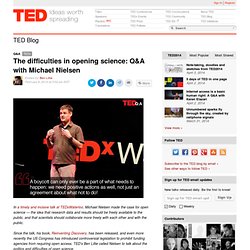
Since the talk, his book, Reinventing Discovery, has been released, and even more recently the US Congress has introduced controversial legislation to prohibit funding agencies from requiring open access. TED’s Ben Lillie called Nielsen to talk about the politics and difficulties of open science. Your talk got a significant pick-up from the science community and other people starting to discuss the idea of open science. Have you seen people moving more toward this notion of doing open science, or at least that – I mean, your goal here is to spark a conversation and get that into the things that people are talking about.
Is it happening? Yeah, I think it’s definitely on the up-tick. There are two great places to start. Science et curation : nouvelle pratique du Web 2.0. Internet permet de publier et d’échanger chaque jour des milliards de données, auxquelles accèdent plus de 2 milliards de personnes dans le monde.
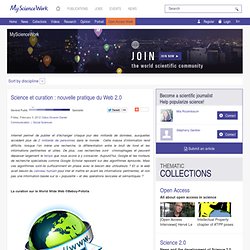
Cette masse d’information rend difficile, lorsque l’on mène une recherche, la différentiation entre le bruit de fond et les informations pertinentes et utiles. De plus, ces recherches sont chronophages et peuvent dépasser largement le temps que nous avons à y consacrer. Aujourd’hui, Google et les moteurs de recherche spécialisés comme Google Scholar reposent sur des algorithmes éprouvés.
Mais ces algorithmes sont-ils suffisamment en phase avec le besoin des utilisateurs ? Et si le web avait besoin du cerveau humain pour trier et mettre en avant les informations pertinentes, et non pas une information basée sur la « popularité » et des opérations lexicales et sémantiques ? Is the Open Science Revolution For Real? Open science. Open science is the umbrella term of the movement to make scientific research, data and dissemination accessible to all levels of an inquiring society, amateur or professional.
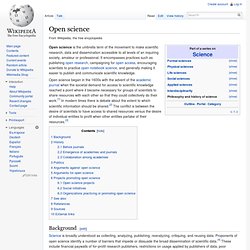
It encompasses practices such as publishing open research, campaigning for open access, encouraging scientists to practice open notebook science, and generally making it easier to publish and communicate scientific knowledge. The Open Knowledge Foundation: Open Data Means Better Science. Figures Citation: Molloy JC (2011) The Open Knowledge Foundation: Open Data Means Better Science.
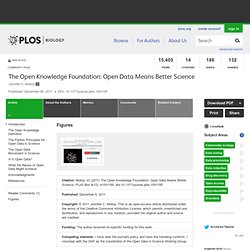
PLoS Biol 9(12): e1001195. doi:10.1371/journal.pbio.1001195 Published: December 6, 2011 Copyright: © 2011 Jennifer C. Molloy. Open source scientific software. What, exactly, is Open Science? TEDxWaterloo - Michael Nielsen - Open Science. Open Science Federation. The Future of Academic Research. Yesterday, Nature – one of the worlds premier scientific journals recognized University of British Columbia scientist Rosie Redfield as one of the top 10 science newsmakers of 2011.
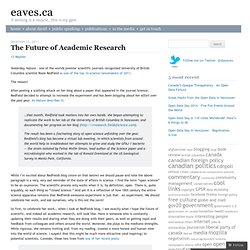
The reason? After posting a scathing attack on her blog about a paper that appeared in the journal Science, Redfield decided to attempt to recreate the experiment and has been blogging about her effort over the past year. As Nature describes it: …that month, Redfield took matters into her own hands: she began attempting to replicate the work in her lab at the University of British Columbia in Vancouver, and documenting her progress on her blog ( result has been a fascinating story of open science unfolding over the year.
While I’m excited about Redfields blog (more on that below) we should pause and note the above paragraph is a very, very sad reminder of the state of affairs in science. So I’m pretty sure I screwed something up. And and then this blog post title: Some control results! Don’t believe me?